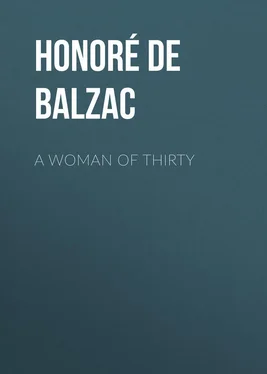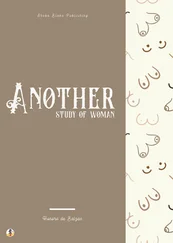Honoré Balzac - A Woman of Thirty
Здесь есть возможность читать онлайн «Honoré Balzac - A Woman of Thirty» — ознакомительный отрывок электронной книги совершенно бесплатно, а после прочтения отрывка купить полную версию. В некоторых случаях можно слушать аудио, скачать через торрент в формате fb2 и присутствует краткое содержание. Жанр: literature_19, foreign_antique, foreign_prose, на английском языке. Описание произведения, (предисловие) а так же отзывы посетителей доступны на портале библиотеки ЛибКат.
- Название:A Woman of Thirty
- Автор:
- Жанр:
- Год:неизвестен
- ISBN:нет данных
- Рейтинг книги:4 / 5. Голосов: 1
-
Избранное:Добавить в избранное
- Отзывы:
-
Ваша оценка:
- 80
- 1
- 2
- 3
- 4
- 5
A Woman of Thirty: краткое содержание, описание и аннотация
Предлагаем к чтению аннотацию, описание, краткое содержание или предисловие (зависит от того, что написал сам автор книги «A Woman of Thirty»). Если вы не нашли необходимую информацию о книге — напишите в комментариях, мы постараемся отыскать её.
A Woman of Thirty — читать онлайн ознакомительный отрывок
Ниже представлен текст книги, разбитый по страницам. Система сохранения места последней прочитанной страницы, позволяет с удобством читать онлайн бесплатно книгу «A Woman of Thirty», без необходимости каждый раз заново искать на чём Вы остановились. Поставьте закладку, и сможете в любой момент перейти на страницу, на которой закончили чтение.
Интервал:
Закладка:
When the dowager had finished reading the letter, and after such a beginning the rest must have been sad indeed, she slowly laid her spectacles on the table, put the letter down beside them, and looked fixedly at her niece. Age had not dimmed the fire in those green eyes as yet.
“My little girl,” she said, “a married woman cannot write such a letter as this to a young unmarried woman; it is scarcely proper – ”
“So I was thinking,” Julie broke in upon her aunt. “I felt ashamed of myself while you were reading it.”
“If a dish at table is not to our taste, there is no occasion to disgust others with it, child,” the old lady continued benignly, “especially when marriage has seemed to us all, from Eve downwards, so excellent an institution… You have no mother?”
The Countess trembled, then she raised her face meekly, and said:
“I have missed my mother many times already during the past year; but I have myself to blame, I would not listen to my father. He was opposed to my marriage; he disapproved of Victor as a son-in-law.”
She looked at her aunt. The old face was lighted up with a kindly look, and a thrill of joy dried Julie’s tears. She held out her young, soft hand to the old Marquise, who seemed to ask for it, and the understanding between the two women was completed by the close grasp of their fingers.
“Poor orphan child!”
The words came like a final flash of enlightenment to Julie. It seemed to her that she heard her father’s prophetic voice again.
“Your hands are burning! Are they always like this?” asked the Marquise.
“The fever only left me seven or eight days ago.”
“You had a fever upon you, and said nothing about it to me!”
“I have had it for a year,” said Julie, with a kind of timid anxiety.
“My good little angel, then your married life hitherto has been one long time of suffering?”
Julie did not venture to reply, but an affirmative sign revealed the whole truth.
“Then you are unhappy?”
“On! no, no, aunt. Victor loves me, he almost idolizes me, and I adore him, he is so kind.”
“Yes, you love him; but you avoid him, do you not?”
“Yes… sometimes… He seeks me too often.”
“And often when you are alone you are troubled with the fear that he may suddenly break in on your solitude?”
“Alas! yes, aunt. But, indeed, I love him, I do assure you.”
“Do you not, in your own thoughts, blame yourself because you find it impossible to share his pleasures? Do you never think at times that marriage is a heavier yoke than an illicit passion could be?”
“Oh, that is just it,” she wept. “It is all a riddle to me, and can you guess it all? My faculties are benumbed, I have no ideas, I can scarcely see at all. I am weighed down by vague dread, which freezes me till I cannot feel, and keeps me in continual torpor. I have no voice with which to pity myself, no words to express my trouble. I suffer, and I am ashamed to suffer when Victor is happy at my cost.”
“Babyish nonsense, and rubbish, all of it!” exclaimed the aunt, and a gay smile, an after-glow of the joys of her own youth, suddenly lighted up her withered face.
“And do you too laugh!” the younger woman cried despairingly.
“It was just my own case,” the Marquise returned promptly. “And now Victor has left you, you have become a girl again, recovering a tranquillity without pleasure and without pain, have you not?”
Julie opened wide eyes of bewilderment.
“In fact, my angel, you adore Victor, do you not? But still you would rather be a sister to him than a wife, and, in short, your marriage is emphatically not a success?”
“Well – no, aunt. But why do you smile?”
“Oh! you are right, poor child! There is nothing very amusing in all this. Your future would be big with more than one mishap if I had not taken you under my protection, if my old experience of life had not guessed the very innocent cause of your troubles. My nephew did not deserve his good fortune, the blockhead! In the reign of our well-beloved Louis Quinze, a young wife in your position would very soon have punished her husband for behaving like a ruffian. The selfish creature! The men who serve under this Imperial tyrant are all of them ignorant boors. They take brutality for gallantry; they know no more of women than they know of love; and imagine that because they go out to face death on the morrow, they may dispense to-day with all consideration and attentions for us. The time was when a man could love and die too at the proper time. My niece, I will form you. I will put an end to this unhappy divergence between you, a natural thing enough, but it would end in mutual hatred and desire for a divorce, always supposing that you did not die on the way to despair.”
Julie’s amazement equaled her surprise as she listened to her aunt. She was surprised by her language, dimly divining rather than appreciating the wisdom of the words she heard, and very much dismayed to find what this relative, out of great experience, passed judgment upon Victor as her father had done, though in somewhat milder terms. Perhaps some quick prevision of the future crossed her mind; doubtless, at any rate, she felt the heavy weight of the burden which must inevitably overwhelm her, for she burst into tears, and sprang to the old lady’s arms. “Be my mother,” she sobbed.
The aunt shed no tears. The Revolution had left old ladies of the Monarchy but few tears to shed. Love, in bygone days, and the Terror at a later time, had familiarized them with extremes of joy and anguish in such a sort that, amid the perils of life, they preserved their dignity and coolness, a capacity for sincere but undemonstrative affection which never disturbed their well-bred self-possession, and a dignity of demeanor which a younger generation has done very ill to discard.
The dowager took Julie in her arms, and kissed her on the forehead with a tenderness and pity more often found in women’s ways and manner than in their hearts. Then she coaxed her niece with kind, soothing words, assured her of a happy future, lulled her with promises of love, and put her to bed as if she had been not a niece, but a daughter, a much-beloved daughter whose hopes and cares she had made her own. Perhaps the old Marquise had found her own youth and inexperience and beauty again in this nephew’s wife. And the Countess fell asleep, happy to have found a friend, nay a mother, to whom she could tell everything freely.
Next morning, when the two women kissed each other with heartfelt kindness, and that look of intelligence which marks a real advance in friendship, a closer intimacy between two souls, they heard the sound of horsehoofs, and, turning both together, saw the young Englishman ride slowly past the window, after his wont. Apparently he had made a certain study of the life led by the two lonely women, for he never failed to ride by as they sat at breakfast, and again at dinner. His horse slackened pace of its own accord, and for the space of time required to pass the two windows in the room, its rider turned a melancholy look upon the Countess, who seldom deigned to take the slightest notion of him. Not so the Marquise. Minds not necessarily little find it difficult to resist the little curiosity which fastens upon the most trifling event that enlivens provincial life; and the Englishman’s mute way of expressing his timid, earnest love tickled Mme. de Listomere. For her the periodically recurrent glance became a part of the day’s routine, hailed daily with new jests. As the two women sat down to table, both of them looked out at the same moment. This time Julie’s eyes met Arthur’s with such a precision of sympathy that the color rose to her face. The stranger immediately urged his horse into a gallop and went.
Читать дальшеИнтервал:
Закладка:
Похожие книги на «A Woman of Thirty»
Представляем Вашему вниманию похожие книги на «A Woman of Thirty» списком для выбора. Мы отобрали схожую по названию и смыслу литературу в надежде предоставить читателям больше вариантов отыскать новые, интересные, ещё непрочитанные произведения.
Обсуждение, отзывы о книге «A Woman of Thirty» и просто собственные мнения читателей. Оставьте ваши комментарии, напишите, что Вы думаете о произведении, его смысле или главных героях. Укажите что конкретно понравилось, а что нет, и почему Вы так считаете.












